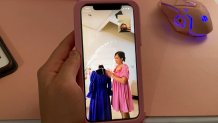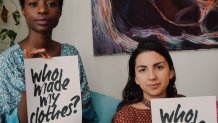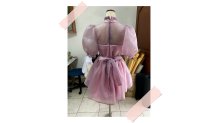It is midnight in Maryland and Nadia Tandra is on a video call with the owner of the garment factory she works with in Indonesia. Nadia is virtually looking over the production of the fall collection for her brand Lunellery.
In 2020, Nadia launched her first design of princess-style, romantic dresses made of dead-stock fabrics. Each is made of 100% cotton or 100% polyester, meaning they are less likely to end up in landfills.
What is ethical fashion?
As a business owner, Nadia said she wanted to emulate the way her grandmother, a former owner of a garment factory, treated her own workers fairly.
"The garment factory that I work with right now is one of my closest friends that I've known for a long time," Nadia said. "We worked together in the fashion industry."

Nadia said she had been disappointed by statistics that show how major clothing companies treat garment workers.
Fashion Revolution, a non-profit that researches, educates and campaigns to end "human and environmental exploitation in the global fashion industry," releases an annual study that analyzes 250 of the biggest fashion brands' human rights and environmental policies.
The 2021 study revealed a lack of transparency about how these companies treat garment workers. Ninety-nine percent of companies did not disclose the number of workers in their supply chain who are being paid a living wage, according to the 2021 Fashion Revolution Transparency Index.
Throughout the COVID-19 pandemic, the study also found that only 3% of brands disclosed how many workers in their supply chain were laid off as a result of the pandemic. This left Fashion Revolution with an "'incomplete picture' of the negative socio-economic impact workers have faced throughout the pandemic."

In 2020, the study found that most companies don't disclose how they check their suppliers for human rights violations, and only about 5% of major brands surveyed reported "annual, measurable progress towards paying living wages to workers in their supply chains."
Mimi Miller started her D.C.-area-based brand M.M. Womenswear in 2016, a year after she graduated college. From the beginning, she focused her business on ethical fashion.
"To me, ethical fashion means that the people who are making any product that I produce are working in safe conditions," Miller said. "They are being paid what they deserve."
"They are working normal hours, they are getting breaks, they are not being locked up in a sweatshop," she continued. "Just like basic human rights."
Miller said there has been a boom of designers, such as Nadia, who have embraced ethical fashion in the last couple of years.
"I think it was just very unplanned and all coincidental," Miller said about the boom.
"All of our conversations, in terms of marketing our businesses, but also speaking to customers about it, is really what helps bring it to the forefront and where it is today," she said.
Building Transparency

The team Nadia works with consists of 10 to 15 people.
"They have the same goals," Nadia said about the relationship between the workers who sew her garments and the factory owner. "They want to achieve success by creating high-quality garments."
The production process can take up to two months, which Nadia says is longer than the time mass-producing clothing companies take.
"That's how we are different," she said.
To build a trustworthy, ethical brand, Nadia emphasized the importance of being hands-on and building close relationships with everybody involved. She uses social media to take customers behind the scenes.
"We love to share our story behind each and every collection and just be transparent with our audience, like the process of designing and producing," she said.
Miller says transparency is the foundation of her company.
"Transparency with my factories and suppliers and also translating that into transparency between myself and my customers," she said.
Photos: Mimi Miller Womenswear
When she goes to textile shows to get fabrics, Miller said she is able to ask questions directly about how products are made.
"I love having your hands in every step," Miller said. "So that way I really know what's going on."
Miller's advice for those who want to launch their own ethical or sustainable brand is to start slowly.
"I think you should pick one or two things to really focus on in the beginning— whether it's being a sustainable brand or ethical brand," she said. "And then once that's sort of mastered, then to add on a new goal."
"I just think taking baby steps is the way to go."
This is part of a series of sustainable and ethical fashion in the D.C. area. Find the first part here.

